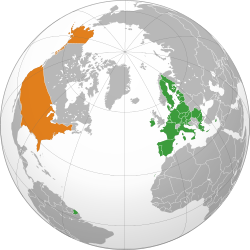TTIP

The United States (orange) and the European Union (green)
|
|
| Type | Trade agreement |
|---|---|
| Drafted | TBA |
| Signed | TBA |
| Effective | Not yet in force |
| Condition | Approval by all 28 members of the Council of the European Union and by the majority of members of the European Parliament, and by both houses of the United States Congress |
| Original signatories |
|
| Languages | English, French, and German |
The Transatlantic Trade and Investment Partnership (TTIP) is a proposed trade agreement between the European Union and the United States, with the aim of promoting trade and multilateral economic growth. TTIP is considered a companion agreement to the Trans-Pacific Partnership (TPP). The agreement is under ongoing negotiations. Its main three broad areas are market access, specific regulation, and broader rules and principles and modes of co-operation. The negotiations were planned to be finalized by the end of 2014, but will not be finished until 2019 or 2020, according to economist Hosuk Lee-Makiyama.
The reports on the ongoing negotiations and the contents of the negotiated TTIP proposals are classified from the public, and can be accessed only by authorised persons. Multiple leaks of proposed TTIP contents into the public caused controversy.
The European Commission says that the TTIP would boost the EU's economy by €120 billion, the US economy by €90 billion and the rest of the world by €100 billion. According to Anu Bradford, law professor at Columbia Law School, and Thomas J. Bollyky of the Council on Foreign Relations, TTIP aims to "liberalise one-third of global trade" and could create millions of new jobs. A Guardian article by Dean Baker of the US thinktank Center for Economic and Policy Research argued that the economic benefits per household would be relatively small, and according to a European Parliament report, the effects range from net job gains to net job losses, depending on the economic models and assumptions used for predictions.
The agreement has been criticized and opposed by some unions, charities, NGOs and environmentalists, particularly in Europe.The Independent describes common criticisms of TTIP as "reducing the regulatory barriers to trade for big business, things like food safety law, environmental legislation, banking regulations and the sovereign powers of individual nations", or more critically as an "assault on European and US societies by transnational corporations".The Guardian noted the criticism of TTIP's "undemocratic nature of the closed-door talks", "influence of powerful lobbyists", TTIP's potential ability to "undermine the democratic authority of local government", and described it as "the most controversial trade deal the EU has ever negotiated". An EU direct democracy mechanism, the European Citizens' Initiative, which enables EU citizens to call directly on the European Commission to propose a legal act, acquired over 3.2 million signatures against TTIP and CETA within a year.
...
Wikipedia
